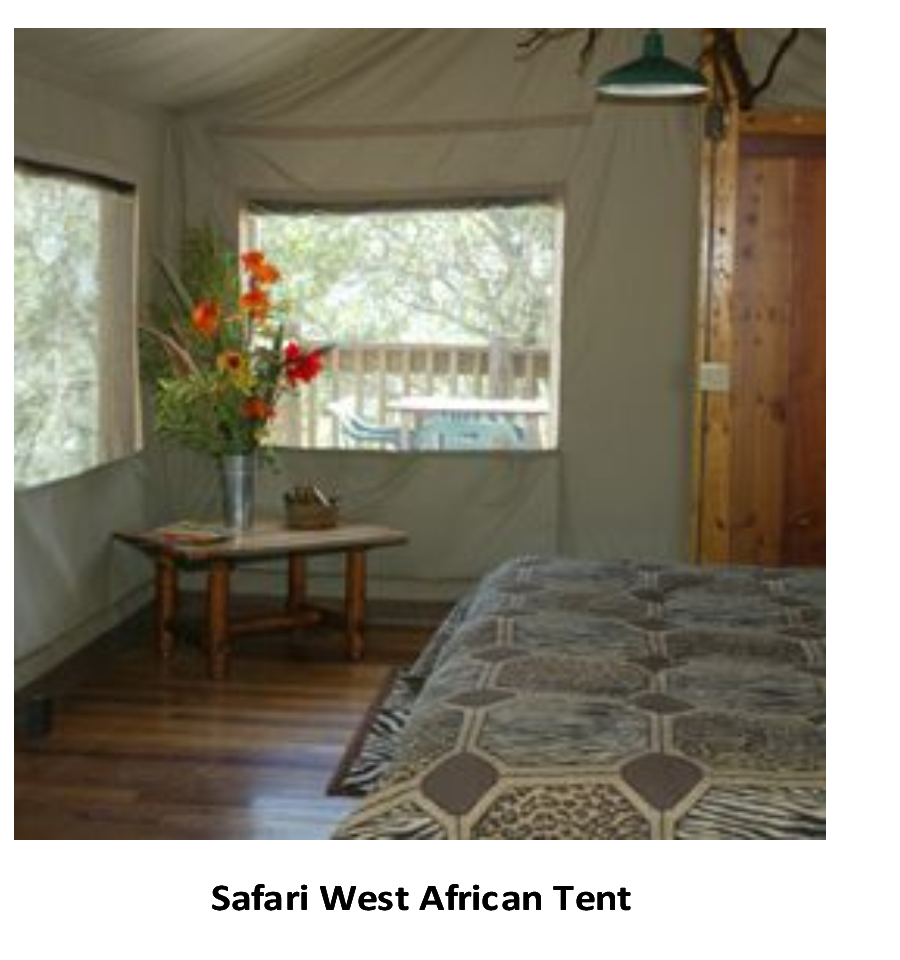I had a farm in Africa at the foot of the Ngong Hills. The Equator
runs across these highlands, a hundred miles to the north, and the
farm lay at an altitude of over six thousand feet. In the day-time
you felt that you had got high up; near to the sun, but the early
mornings and evenings were limpid and restful, and the nights were
cold.
—Karen
Blixen, "Out of Africa"
I had a tent in Africa,
or the California version of Africa, in the Sonoma Hills just
outside the Napa Valley. The 40th latitude line from the equator
runs through these highlands, 75 miles from San Francisco; the
altitude is between 90 and 1,100 feet.
When I was there in
mid-June, the days were sunny and cool; the nights would have been
very cold in the tent if it hadn't been for the electric blanket and
layers of quilts.
I'd always wanted to go
on safari in Africa, see the wild animals of the Serengeti. Safari
West, "the spirit of Africa in the heart of wine country", was close
enough for someone who no longer enjoys long airplane flights,
doesn't want to get shots, and tries not to be within a thousand
miles of savage civil wars.
So when planning this
year's vacation with my family, I searched for "African safaris in
the United States", and found one a short drive from their home in
northern Nevada.
I half-expected a
glorified zoo, but
Safari West
is "an authentic African wildlife preserve — a working ranch" which
holds more biological diversity than one could get with any one real
African safari. Most animals have been bred here in the United
States to preserve, protect and showcase various species that would
be found from Madagascar to the Kalahari Desert on the other
continent.
From our tent we could
see the herd of reticulated giraffe, native to Kenya, and walk to
the new exhibit of flamingos, various shades of pink from South
Africa.
This privately owned
park, through exchanges with other zoos and parks, helps keep the
gene pool healthy for various species, some of which are considered
to be virtually
extinct in the wild but may someday be re-introduced there. This
mission made the cost of a one-night stay and two-hour jeep
excursion a contribution to more than just our family's
multi-generational enjoyment.
 Lance and Mary have
been taking my grandchildren camping since they were toddlers, but
they had never slept in a double bed-sized bunk (11-year-old twins
had easy dibs on the upper: I won the king-size bed that my knees
could easily get me out of). The tent was from South Africa, open
with screened sections all around for air during the day; we were
quick to lower the flaps when the sun set and the wind rose from the
nearby Pacific Ocean. Must admit we turned on the heater in the
attached full bath.
Lance and Mary have
been taking my grandchildren camping since they were toddlers, but
they had never slept in a double bed-sized bunk (11-year-old twins
had easy dibs on the upper: I won the king-size bed that my knees
could easily get me out of). The tent was from South Africa, open
with screened sections all around for air during the day; we were
quick to lower the flaps when the sun set and the wind rose from the
nearby Pacific Ocean. Must admit we turned on the heater in the
attached full bath.
By 9, we were all in
bed reading, the covers up to our chins; later in the dark we could
listen to the squawking of the flamingos and the occasional howl and
screech from somewhere outside. I was getting up every few hours to
step out on the deck, look at the stars in a clear sky above the
trees.
I could imagine I was
Karen Blixen, who took her Limoge dinnerware with her to the farm,
trying to introduce an element of European civilization to her
African experience. I remember thinking as I watched the movie "Out
of Africa" decades ago, that in her place I would quickly revert to
our hominid ancestry, be squatting in a loincloth near a
lightning-caused fire, gnawing on an antelope bone. But I was young
then. Now I want a picnic lunch with plastic cutlery, and indoor
plumbing.
The next day we went
down the hill to a buffet breakfast, then climbed into an open jeep
for our safari. We had to stay in the vehicle, as our guide jumped
out to open and close the various gates dividing the animals who
don't get along. The zebras mixed happily with the wildebeest herd,
but the cheetahs and rhinos had their own large enclosures. We saw
the dangerous cape buffalo from a distance, but I could have touched
an ostrich, had I been so presumptuous.
There were many
varieties of antelope, including one that can kill a lion by
impaling it on sharp curved horns. We saw a newborn antelope,
protected by its father as its mother was eating the afterbirth. A
lemur nursed its baby in a tree.
I could imagine myself
at that level of my kind's evolution, catching the sun's earliest
rays on a topmost branch. I could also imagine myself staying in a
tent at Safari West for the rest of the 2012 election year.
I'm back in
Massachusetts but, catching up on the news I think of what Doc Ford
said in the latest Randy Wayne White novel: "We gave up life in the
trees, the ability to hang by our toes and scratch our own backs,
for this?"
Never mind. Without
those protective fences, life in the African wild wasn't and isn't a
picnic for anything but the largest predators, which we can vote
against this year.
The comments made
and opinions expressed in her columns are those of Barbara Anderson
and do not necessarily reflect those of Citizens for Limited Taxation.